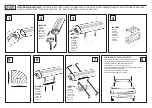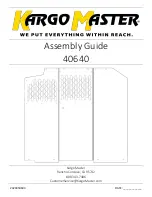
On vehicles with the AIRMATIC package, you
must drive at raised vehicle level if snow
chains have been fitted (
Y
page 188).
Do not exceed the maximum permissible
speed of 50 km/h.
i
You may wish to deactivate
ESP
®
(
Y
page 63) when pulling away with
snow chains fitted. This way you can allow
the wheels to spin in a controlled manner,
achieving an increased driving force (cut-
ting action).
Tyre pressure
Tyre pressure specifications
You will find a table of tyre pressures for var-
ious operating conditions on the inside of
your vehicle's fuel filler flap.
Operation with emergency spare wheel:
the applicable value for the emergency spare
wheel is stated on the spare wheel and in the
technical data section.
Operation with a trailer: the applicable
value for the rear tyres is the maximum tyre
pressure value stated on the table inside the
fuel filler flap.
The table inside the fuel filler flap may state
tyre pressures for different load conditions.
These are defined in the table as different
numbers of passengers and amounts of lug-
gage. The actual number of seats may vary –
for more information, please refer to the vehi-
cle's registration documents.
If no other data is stated, the tyre pressures
specified on the fuel filler flap apply for all
tyres approved for this vehicle.
If a tyre size precedes a tyre pressure, the tyre
pressure information following is only valid
for that tyre size.
G
WARNING
Tyre pressure that is either too high or too low
has a negative effect on the vehicle's driving
safety, which could lead you to cause an acci-
dent. Therefore, you should regularly check
the pressure of all the tyres, particularly prior
to long trips, and correct the pressure as nec-
essary.
To test tyre pressure, use a suitable pressure
gauge. The outer appearance of a tyre does
not permit any reliable conclusion about the
tyre pressure. On vehicles fitted with the elec-
tronic tyre pressure monitor, the tyre pres-
sure can be checked using the on-board com-
puter.
G
WARNING
Do not fit anything else to the tyre valve other
than the standard valve cap. In particular, ret-
rofitted tyre pressure monitors which are
screwed on to the valve may overload it and
cause it to fail. Due to their design, the valve
is kept open continuously, which may lead to
air loss.
Tyre pressure
359
Wh
eels
and
ty
res
Z
















































